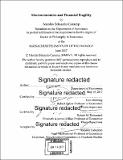| dc.contributor.advisor | Iván Werning and Robert M. Townsend. | en_US |
| dc.contributor.author | Caramp, Nicolás Eduardo | en_US |
| dc.contributor.other | Massachusetts Institute of Technology. Department of Economics. | en_US |
| dc.date.accessioned | 2017-09-15T15:30:21Z | |
| dc.date.available | 2017-09-15T15:30:21Z | |
| dc.date.copyright | 2017 | en_US |
| dc.date.issued | 2017 | en_US |
| dc.identifier.uri | http://hdl.handle.net/1721.1/111351 | |
| dc.description | Thesis: Ph. D., Massachusetts Institute of Technology, Department of Economics, 2017. | en_US |
| dc.description | Cataloged from PDF version of thesis. | en_US |
| dc.description | Includes bibliographical references (pages 189-198). | en_US |
| dc.description.abstract | This thesis consists of three chapters. Chapter 1 studies the interaction between the ex-ante production of assets and ex-post adverse selection in financial markets. Positive shocks that increase market liquidity and prices exacerbate the production of low-quality assets and can increase the likelihood of a financial market collapse. An increase in government bonds increases total liquidity and reduces the incentives to produce bad assets, but can exacerbate adverse selection in private asset markets. Optimal policy balances these two effects, requiring more issuances when the liquidity premium is high. I also study transaction taxes and asset purchases, showing that policy should lean against the wind of market liquidity. Chapter 2, joint work with David Colino and Pascual Restrepo, studies how consumer durables amplify business cycle fluctuations. We show that employment in durable manufacturing industries is more cyclical than in other industries, and that this cyclicality is amplified in general equilibrium. We provide evidence of three mechanisms that generate amplification. First, employment changes propagate through input-output linkages. Second, the reduction of employment in durables negatively affects employment in non-tradable sectors. Third, workers do not completely reallocate to other less cyclical tradable industries. Chapter 3, joint work with Dejanir Silva, studies how the level, maturity structure and characteristics of government debt affects the severity of crises and the effectiveness of stabilization policies. We find that both fiscal and monetary policies become less powerful in high debt economies, and that in response to a preference shock that pushes the economy into a liquidity trap, high debt economies experience larger and more prolonged recessions. Long-term bonds and indexed debt improve the effectiveness of stabilization policies. | en_US |
| dc.description.statementofresponsibility | by Nicolás Eduardo Caramp. | en_US |
| dc.description.tableofcontents | 1. Sowing the Seeds of Financial Crises: Endogenous Asset Creation and Adverse Selection -- 2. Durable Crises (joint with David Colino and Pascual Restrepo) -- 3. Fiscal Fragility (joint with Dejanir Silva). | en_US |
| dc.format.extent | 198 pages | en_US |
| dc.language.iso | eng | en_US |
| dc.publisher | Massachusetts Institute of Technology | en_US |
| dc.rights | MIT theses are protected by copyright. They may be viewed, downloaded, or printed from this source but further reproduction or distribution in any format is prohibited without written permission. | en_US |
| dc.rights.uri | http://dspace.mit.edu/handle/1721.1/7582 | en_US |
| dc.subject | Economics. | en_US |
| dc.title | Macroeconomics and financial fragility | en_US |
| dc.type | Thesis | en_US |
| dc.description.degree | Ph. D. | en_US |
| dc.contributor.department | Massachusetts Institute of Technology. Department of Economics | |
| dc.identifier.oclc | 1003291049 | en_US |
